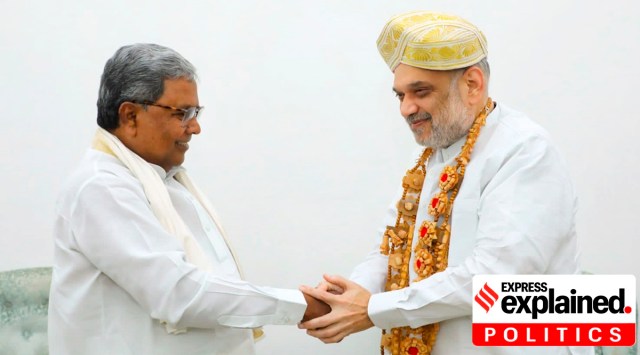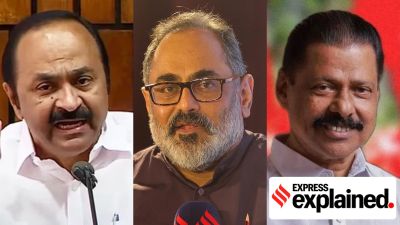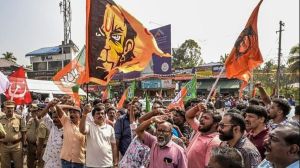Why Karnataka CM Siddaramaiah has accused the Centre of derailing its rice to BPL families scheme
The planned July 1 rollout of the Anna Bhagya scheme in Karnataka has hit a roadblock, due to a recent decision by the Central government that restricted the Food Corporation of India (FCI) from selling rice and wheat to state governments.
 Karnataka Chief Minister Siddaramaiah (left) calls on Union Home Minister Amit Shah, in New Delhi, Wednesday, June 21, 2023. (PTI Photo)
Karnataka Chief Minister Siddaramaiah (left) calls on Union Home Minister Amit Shah, in New Delhi, Wednesday, June 21, 2023. (PTI Photo) Ahead of the Karnataka Legislative Assembly elections held on May 10, 2023, the Congress party made five guarantees to the people of the state, assuring them that the party would implement them as soon as it came to power. Riding on the wave of support – in no small part due to these guarantees – the Congress secured a landslide win in the state, winning 135 of the 224 seats in the Legislative Assembly.
However, implementation of one of these five guarantees, the Anna Bhagya scheme, has now hit a roadblock due to a recent decision by the Central government, restricting the Food Corporation of India (FCI) from selling rice and wheat to state governments – except to northeastern states or those reeling under natural disasters.
What are the Congress’s guarantee schemes in Karnataka?
The guarantee schemes are flagship assurances of the Congress government, which helped propel the party to its recent electoral win in Karnataka. The guarantees include:
*Gruha Jyothi, which promises up to 200 units of free power for all families.
*Gruha Lakshmi, which is to transfer Rs 2,000 to each woman head of a family. The scheme will be applicable to both Below Poverty Line (BPL) and Above Poverty Line (APL) card holders, and women who are availing social security, old age or disability pension are also eligible.
*Shakti, the recently-launched free bus travel scheme for women and transgender people with respect to government buses, other than in luxury, AC classes within the state.
*Yuva Nidhi, for unemployed youngsters who graduated in 2022-23, who will be provided Rs 3,000 – and diploma holders Rs 1,500 – for 24 months from the date of registration.
*The Anna Bhagya scheme, which promised 10 kg grains per month per member of BPL families in the state. This, according to the government, was ‘Anna Bhagya 2.0’ as the scheme was first launched in 2013, soon after Siddaramaiah was elected CM for the first time.
What is the cost of Anna Bhagya scheme? Who are its beneficiaries?
The scheme, according to the state government, is expected to cost Rs 840 crore for procuring 2.28 lakh metric tonnes of rice per month and around Rs 10,080 crore per year. The Central government also distributes five kg of rice, so this rice will be an additional five kg provided by the state government, totalling 10 kg.
Food and Civil Supplies Department data shows that there are around 1.28 cr BPL families in the state, with 4.42 cr individuals, who will be beneficiaries of the scheme. In the five kg grain supply scheme of the state government, there are plans to supply two kg of ragi and three kg rice in parts of southern Karnataka and two kg of jowar and three kg rice in northern Karnataka districts.
However, the launch of the scheme hinges on the availability of rice – which the state government is struggling to arrange ahead of the rollout of the scheme from July 1.
What is the dispute?
On June 14, Chief Minister Siddaramaiah chaired a press conference, accusing the Central government of taking a “political decision” of discontinuing the sale of rice and wheat from FCI to state governments under its Open Market Supply Scheme (Domestic) (OMSS(D)).
FCI sells surplus stocks of wheat and rice under this scheme at predetermined prices, at times through e-auction in the open market from time to time, to “enhance the supply of food grains, especially wheat during the lean season”, according to its website, to moderate the open market prices. Under this, states are also allowed to purchase rice (including fortified rice) and wheat from the FCI for their own schemes at the rate fixed by the FCI.
Siddaramiah said the FCI had agreed on June 12 to supply the grains required for the scheme. However, a letter by the Ministry of Consumer Affairs, Food and Public Distribution on June 13 discontinued the “sale of wheat and rice under OMSS(D) for State Governments”, except to “North-East States, Hilly States and States facing law & order situation, natural calamities, at an existing rate of Rs 3,400/quintal”.
ಭಾರತೀಯ ಆಹಾರ ನಿಗಮ (ಎಫ್ಸಿಐ) ಕರ್ನಾಟಕಕ್ಕೆ ಅಕ್ಕಿ ಕೊಡುತ್ತೇವೆ ಎಂದು ಹೇಳಿರುವ ಕಮಿಟ್ಮೆಂಟ್ ಪತ್ರ ತೋರಿಸಲಿ ಎಂದು ಬಿಜೆಪಿ ನಾಯಕ @CTRavi_BJP ಸವಾಲು ಹಾಕಿದ್ದರು.
ಇಲ್ಲಿದೆ ಎಫ್.ಸಿ.ಐ ಕಮಿಟ್ಮೆಂಟ್ ಪತ್ರ.
ಇಂತಹ ಬೇಜವಾಬ್ದಾರಿ ಹೇಳಿಕೆ, ಸುಳ್ಳು ಮತ್ತು ಅಪಪ್ರಚಾರದ ಗೀಳಿಗಾಗಿಯೇ ರಾಜ್ಯದ ಪ್ರಜ್ಞಾವಂತ ಮತದಾರರು ಬಿಜೆಪಿಯ ಇಂತಹ… pic.twitter.com/y6uT7eLXlw
— Siddaramaiah (@siddaramaiah) June 16, 2023
In a desperate attempt to create problems for the implementation of Anna Bhagya 2.0, @narendramodi led Government of India writes to FCI to stop sale of rice to State under Open Market Sale Scheme.
Why is @narendramodi & @BJP4Karnataka against us giving 10 Kgs of free rice to… pic.twitter.com/OlclyUaTbF
— Siddaramaiah (@siddaramaiah) June 15, 2023
Story continues below this ad
The FCI, according to the CM, had agreed to supply rice at Rs 36.6 per kg, which included a transportation cost of Rs 2.60 per kg.
“The central government is trying to scuttle [the scheme] that provides rice to poor people… They should not have politicised this… Despite the availability of stock, they [FCI] are refusing to supply,” he said, contending that the FCI was sitting on a stock of seven lakh metric tonnes of rice. While the Ministry allows the sale of grains to private vendors, it has barred supply to states. The Government of India will be responsible for any delay in the supply of grains, he said.
The FCI then issued a statement, saying that the decision was “part of the market intervention program of the govt of India, to control the inflationary trends and to rein in the rising price of wheat and rice… In order to ensure that the inflationary trends are kept under control while ensuring adequate stock levels in the Central poll it has been decided to exclude State Govts’ scheme from the ambit of OMSS(D), this time.”
“The decision was not taken suddenly. It was not deliberate. The order came on June 13 after long inter-ministerial consultations. So, it was not a sudden decision for a particular state, it was for the whole country,” Subhod Kumar Singh, Additional Secretary in the Food Ministry, said in a press conference.
Meanwhile, the state BJP leaders attacked the government over the delay in the implementation of the scheme. BJP MP Tejasvi Surya said that the Karnataka government had written to FCI four days after an inter-ministerial committee decided to stop the sale of grains to states.
Protests were also held by the ruling Congress, blaming the Central government for blocking the scheme and in opposition to the BJP, with demands made for the implementation of the guarantees.
How will Karnataka procure rice now?
After the FCI decision, Karnataka has reached out to rice-cultivating states such as Telangana, Chhattisgarh, Andhra Pradesh and Punjab for rice, but with little success. Only Chhattisgarh has agreed to supply 1.5 lakh metric tonnes, that too for only for a month.
The government has also approached National Cooperative Consumers Federation, National Agricultural Cooperative Marketing Federation and Kendriya Bhandar. The rice procured from other states and these agencies, if supplied, was expected to cost more than the FCI supply.
On Wednesday, Karnataka Food and Civil Supplies Minister K H Muniyappa told reporters in Delhi that with the FCI’s letter, “there is a slight delay. We will definitely give rice. But, there could be a slight delay.”
Siddaramaiah, who was also in Delhi on Wednesday, met Union Home Minister Amit Shah and urged him to lift the restriction on sale of rice to states under OMSS(D). He told reporters that Shah assured that he would speak to Piyush Goyal, Union Minister for Consumer Affairs, Food and Public Distribution, about the issue.
- 01
- 02
- 03
- 04
- 05





































